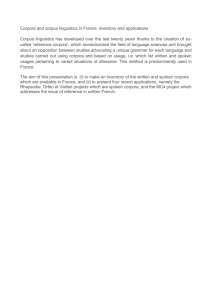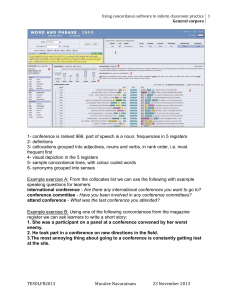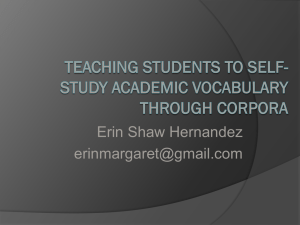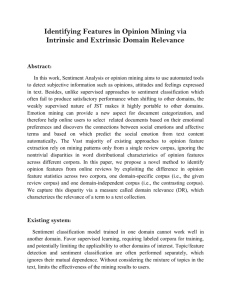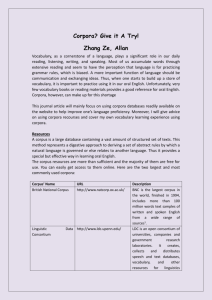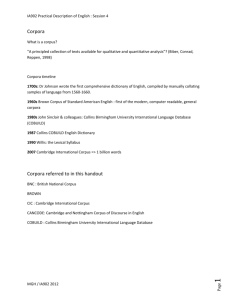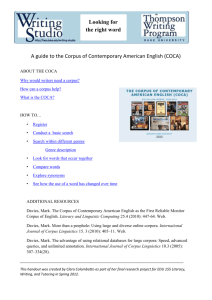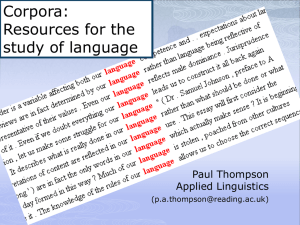Формирование лексических навыков письменной речи с
advertisement
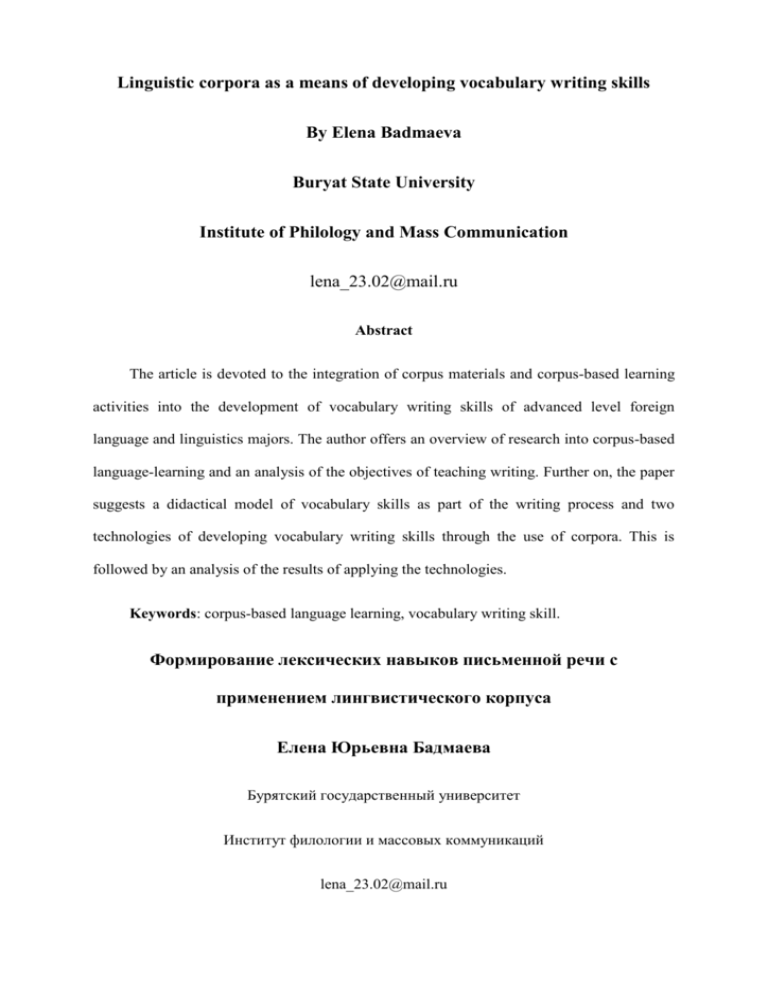
Linguistic corpora as a means of developing vocabulary writing skills By Elena Badmaeva Buryat State University Institute of Philology and Mass Communication lena_23.02@mail.ru Abstract The article is devoted to the integration of corpus materials and corpus-based learning activities into the development of vocabulary writing skills of advanced level foreign language and linguistics majors. The author offers an overview of research into corpus-based language-learning and an analysis of the objectives of teaching writing. Further on, the paper suggests a didactical model of vocabulary skills as part of the writing process and two technologies of developing vocabulary writing skills through the use of corpora. This is followed by an analysis of the results of applying the technologies. Keywords: corpus-based language learning, vocabulary writing skill. Формирование лексических навыков письменной речи с применением лингвистического корпуса Елена Юрьевна Бадмаева Бурятский государственный университет Институт филологии и массовых коммуникаций lena_23.02@mail.ru Аннотация Статья посвящена вопросам использования лингвистического корпуса для формирования лексических навыков письменной речи студентов старших курсов языкового вуза. В статье предлагается обзор исследований обучения на основе корпуса, анализ целей и задач обучения письменной речи, авторская лингводидактическая модель лексического навыка письменной речи и технологии применения корпуса для формирования лексических навыков письменной речи. Кроме того, описаны и проанализированы результаты пробного обучения. Ключевые слова: обучение на основе корпуса, лексический навык письменной речи. Corpus-based learning is truly a topical issue in pedagogy and language teaching. New developments in corpus linguistics induce new opportunities for foreign language teachers as a means of demonstrating authentic language. However, technologies of applying corpora to solve particular language learning problems yet remain to be designed. This paper attempts to provide such a technology to enhance the development of vocabulary skills in written speech. A demand for the corpora-based technology in the development of writing skills is conditioned by the fact that there is a growing need for professionals able to communicate in the written mode. While a considerable number of aspects of teaching writing have been carefully explored, the lexical aspect of teaching writing has not been under much scrutiny. Besides, developing corpora-based teaching technologies can be regarded as a way to stimulate independent learning activity and promote self-study skills and autonomous learning strategies. According to the definition by Viktor Pavlovich Zakharov, corpus is a large body of linguistic data, represented in electronic form, unified, structured, tagged, philologically competent, designed for solving concrete linguistic tasks [Zakharov, 2011: 12]. The most common ways of applying corpora in teaching foreign languages include: - direct use of corpus in language learning; - producing exercises based on corpus data, adapted to the level of learners and their special needs; - creating learner corpora. As for the problem of teaching lexis for writing in a foreign language class, there is a large body of research on teaching writing and teaching lexis. Still, there is the lexical aspect of writing in a foreign language has never been in focus of much attention. However, using vocabulary in writing differs in certain ways from using vocabulary in oral communication, which is rarely, if ever, taken into consideration in teaching materials or research. So, mastering the lexical aspect of writing is pretty much left for the students to do on their own, and, what with poor autonomous learning skills, this often results in lexical errors in students writing and inability to anticipate, identify and correct the errors. The current paper attempts to fill this gap. The key issue for this paper is the purpose of teaching writing lexis, that is the development vocabulary skills in written speech. This, in its turn, requires providing a definition of vocabulary skill in written speech. Below we suggest a didactical model of the target skill for this paper. Planning Shaping Drafting Revising Editing Proofreading Idea to be expressed and communicative goal Selecting vocabulary unit Combining vocabulary units Internal pronouncing Recoding oral units into written Graphical realization The left arrow is intended to render the recursive nature of the writing process: we spend a lot of time on the selecting words and often return to the initial stages of the realization of lexical skill to check and change the draft. This model enabled us to design technologies for the development of vocabulary writing skill. One is a technology of learning how to use language corpora for writing an essay, the second one is a technology of using language corpora for writing an essay. The need of two technologies is caused by the necessity to teach students how to use language corpus for writing an essay first, and only after that to start using the resource. In a way, mastering the second technology is the aim of the first technology. The technology of learning how to use language corpora for writing an essay can be applied at the stage of revising, which suggests evaluating the draft and then rewriting it by adding, cutting, replacing, moving, or totally recasting material [Gorbunov, 2000:10]. The technology includes a number of stages presented below. I. Introduction. The teacher delivers the media presentation ‘Language corpora’, gives the instructions, demonstrates how to search the information in the corpora. II. Realization. This stage is performed in three steps: 1) Orientation (understanding the problem). Students analyze each others’ essays and identify lexical mistakes. 2) Application. The teacher gives recommendation for using corpora, demonstrates the procedure with one word. The procedure depends on the type of lexical mistake. The step involves three actions: A. Search in corpora. B. Analysis of information. C. Discussion of the results of search. 3) Using new words in essays. III. Correction. 1) Reflection. Students assess their own study activity of learning lexis with the help of corpus. 2) Assessment. The teacher marks students’ class work and the essays. The scheme below generalizes the key aspects of the technology. Scheme 1 Planning Shaping Drafting I. Introduction 1. Orientation А. Search in corpora Revising Editing II. Realization 2. Application Proofreading III. Correction 3. Using new words in essays В. Analysis of С. Discussion of information the results of search А. Reflection В. Assessment The first technology is intended to help students acquire the skills of using corpora in language education independently. This skill can also be presented as a technology. This technology of using language corpora for writing an essay is employed at the stage of drafting, when students write ideas in sentences and paragraphs. 1) Identifying problems. While writing an essay, students encounter certain vocabulary difficulties, and they are expected to be able to identify their types. 2) Searching. Depending on the type of lexical problem, students select an appropriate type of corpus and search for the word. Then they analyze the obtained data, compare the results and make a decision on the correct usage of a vocabulary unit. 3) Using the vocabulary unit in the essay. The strategy is summed up in scheme 2 below. Scheme 2 Planning 1. Shaping Identification of Drafting 2. Application difficulties А. Search in corpus Revising Editing Proofreading 3. Using new words in essays В. Analysis of detected information The technologies were tested in two groups with a total of 16 advanced level students. The aim of the experiment was to assess the effectiveness of the technologies. The research included three stages: 1) Questionnaire and the first test 2) Learning how to use language corpora 3) The second test In the beginning, the students were asked to answer a questionnaire aimed to identify the typology of vocabulary-related difficulties faced while writing, and also to determine the techniques used for solving these problems. The results showed that the majority of students were worried about the fact that their own vocabulary is too limited for them to be able to express their thoughts adequately. For example, they tended to prefer general words to specific ones. Furthermore, the students reported that they often don’t know how to collocate new vocabulary with other words, whilst consulting a dictionary didn’t help much. Nevertheless, while some students considered it useful to go to web-sites to improve the quality of their writing, most of interviewees agreed that the main resource of information was the dictionary. Thus, the questionnaire indicated a clear need for a technology that would enable students to work on their own vocabulary skills in writing. The first test was supposed to assess students’ lexical skills. The students were asked to fill in the gaps with a suggested selection of synonyms. The test indicated a low level of ability. Then, the first corpora-based technology described in this paper was applied. After the training, the students did the second test. In the fourth year group, the test results showed an improvement of vocabulary skills from 12,8% to 61,6%. Besides, most students agreed that corpora area valuable tool to enhance their vocabulary skills and the quality of their writing in English. They described the technology of using corpora as an absorbing and creative process, and they clearly enjoyed performing the tasks. The experiment in the third year group was carried out at the stage of revising an essay ‘Olympic games’. The experiment included the following steps: 1) The first questionnaire 2) Training how to use corpora 3) Analysis, the second questionnaire, discussion The teacher handed out the students essays with marked but not corrected vocabulary mistakes. In total 42 lexical mistakes were found in 8 essays, i.e. on average, 5,25 mistakes per essay. After a presentation on corpora usage, the students were asked to correct the mistakes using corpora. As a home task, the students were supposed to rewrite the essay, using corpora to solve vocabulary problems. The revised versions of the essays contained 17 lexical mistakes in total, 2,125 mistakes per essay on average. As can be seen, the quantity of mistakes was reduced by 2,5 times. The second questionnaire found out that in spite of the difficulty of the work with unadapted texts and language data from corpora, 100% of the learners reported a positive effect of the experiment and considered using corpora for their writing tasks. The perspectives of further work in this field include developing instructions for using corpora for students and teachers. References 1. Conrad, S. 2004. Corpus linguistics, Language variation and Language teaching in How to use corpora in language teaching. Amsterdam, Benjamins. 2. Flowerdew L. 2013. Corpus Linguistics and English for Specific Purposes: Which unit for linguistic analysis in Corpus Linguistics 2013. Lancaster: UCREL. 3. Gorbunov A.V. 2000. Practice of writing for the students of Foreign Languages Department. Ulan-Ude. Buryat University Press. 204 p. 4. Zakharov V.P. 2011. Corpus linguistics. Irkutsk. ISLU. 48 p. 5. Raitskaya L.K. 2009. Didactical use of corpus technologies in teaching foreign language at high school in Vestnik of Moscow State Regional University – Series: Pedagogy. №4: 123-127. M.
